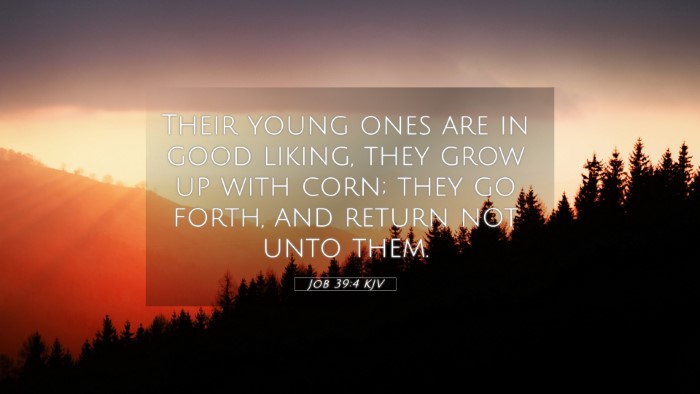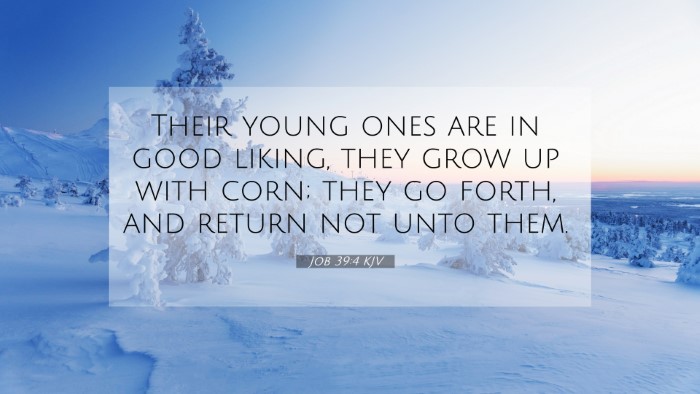Old Testament
Genesis Exodus Leviticus Numbers Deuteronomy Joshua Judges Ruth 1 Samuel 2 Samuel 1 Kings 2 Kings 1 Chronicles 2 Chronicles Ezra Nehemiah Esther Job Psalms Proverbs Ecclesiastes Song of Solomon Isaiah Jeremiah Lamentations Ezekiel Daniel Hosea Joel Amos Obadiah Jonah Micah Nahum Habakkuk Zephaniah Haggai Zechariah MalachiJob 39:4 Similar Verses
Job 39:4 Cross References
Their young ones are in good liking, they grow up with corn; they go forth, and return not unto them.
Uncover the Rich Themes and Topics of This Bible Verse
Listed below are the Bible themes associated with Job 39:4. We invite you to explore each theme to gain deeper insights into the Scriptures.
Job 39:4 Cross Reference Verses
No cross reference images were found in our system for this Bible passage.
Job 39:4 Verse Analysis and Similar Verses
Job 39:4: "Their young ones are in good liking, they grow up with corn; they go forth, and return not unto them."
This verse from the Book of Job highlights the resilience and natural instinct of young creatures, describing their thriving in the wild. The theological implications of this verse can be explored through various public domain commentaries, which provide a rich tapestry of interpretations.
Insights from Matthew Henry
Matthew Henry reflects on the wonder of God's creation, particularly how young animals are nurtured in the wild. He emphasizes that this aspect of creation showcases God's providence and care for all living beings. Henry also notes the contrast between the wild animals' natural instincts and human anxieties about sustenance and protection.
Albert Barnes' Commentary
Albert Barnes focuses on the context of this verse within God's discourse to Job, pointing out the importance of understanding the limitations of human wisdom compared to divine understanding. He interprets the flourishing of young animals as a demonstration of God's sovereignty and the natural order He established, which functions without human intervention.
Adam Clarke's Analysis
Adam Clarke provides a detailed exegesis on the idea that the creatures are well provided for, growing up in a free environment. He points out the dual nature of this flourishing: it celebrates creation while also reminding humanity of their own dependence on God’s provision. Clarke further links this verse to the broader themes of providence and trust in God's design.
Key Themes and Comparisons
The verse can be compared and connected with several other biblical passages that discuss God's provision and the vitality of creation:
- Psalms 104:14-15: "He makes grass grow for the cattle, and plants for the people to cultivate—bringing forth food from the earth..."
- Matthew 6:26: "Look at the birds of the air; they do not sow or reap or store away in barns, and yet your heavenly Father feeds them..."
- Proverbs 12:10: "The righteous care for the needs of their animals, but the kindest acts of the wicked are cruel."
- Isaiah 40:11: "He tends his flock like a shepherd: He gathers the lambs in his arms and carries them close to his heart..."
- Genesis 1:22: "And God blessed them, saying, 'Be fruitful and multiply, and fill the waters in the seas, and let birds multiply on the earth.'"
- Luke 12:24: "Consider the ravens: They do not sow or reap, they have no storeroom or barn; yet God feeds them..."
- Job 12:7-9: "But ask the animals, and they will teach you, or the birds in the sky, and they will tell you; or speak to the earth, and it will teach you, or let the fish in the sea inform you."
Cross-Referencing Insights
Understanding Job 39:4 through these connections reveals significant themes about God's care for creation and the assurance of His provision:
- Tools for Bible Cross-Referencing: Engaging with a Bible cross-reference guide can lead to deeper insights regarding the interconnectedness of scriptures on God's providence.
- Bible Concordance: Utilizing a concordance can help locate verses that discuss similar themes of God's nurturing presence.
- Cross-Reference Bible Study: Employing cross-reference methods can enrich personal study by comparing Job's description of young animals with other texts that celebrate God’s creation.
- Identifying Connections: Identifying links between the Old and New Testaments aids in understanding God’s unchanging nature and His providential care throughout scripture.
- Comparative Studies: A detailed cross-reference between the Gospels can enhance comprehension of God's care as articulated in both the Testaments.
Conclusion
Job 39:4 invites us to contemplate the magnificence of God’s creation and His role as a provider. By studying the verse alongside other scriptures, we gain a more profound understanding of the interconnectedness of God’s message throughout the Bible. The provided commentaries by Matthew Henry, Albert Barnes, and Adam Clarke enrich our interpretation, showcasing the depth and breadth of biblical insights regarding divine providence.


